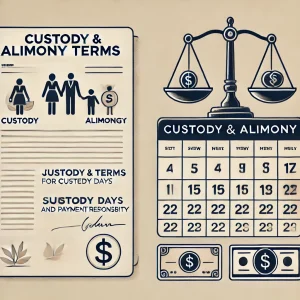Obviously you have something to lose in a divorce battle and not just money! You may lose control of your business, your freedom and your relationship with the children if you do not manage things wisely. With 2 decades of experience in achieving fair divorce agreements I will answer you in advance on a large part of your questions and concerns and show you how to avoid legal and financial problems. Joint custody is custody in which both parents share the time spent with the children equally, or almost equally. Recently, there has been a change in the court’s perception of the issue of custody and the issue of joint custody, and an understanding has begun that the best thing for a child is to be with both parents, as much as possible.

Simultaneously with the change of perception regarding joint custody, there has been a further change among the court judges, and a change can be seen regarding the payment of alimony by the father. It can be seen that unlike in the past, the court is trying to strive for equality both in the area of payment of alimony and in the area of joint custody. As we shall see immediately, unlike in the past, there may well be cases where there will be joint custody without alimony. Income from salary, and given the entire circumstances of the case.
It has been held that this interpretation of Hebrew law is consistent with the principle of the best interests of the child, as it does not entail an excess charge on the father, in a manner that may impair the latter’s economic ability to provide for the child during his staying arrangement; And it promotes equality between women and men as it does not impose an excess charge on alimony imposed on one parent on the grounds of sex alone, and without regard to his income and other considerations relevant to the circumstances of the individual case.
As stated, in light of the Supreme Court’s new ruling which obliges district courts and family courts, when a couple files for divorce, custody and alimony, the court will now look at both parties, the mother’s income as it looks at the father’s income, its earning potential. , As well as additional sources of help and funding if present. Only after the court has examined all the parameters will the alimony be determined, also in accordance with the times of the children’s stay with the father. In a situation where the mother’s income is equal to the father and even exceeds it – the alimony will be canceled completely. A father who is approaching a divorce proceeding and wants to check if there is a chance that he will not be charged alimony at all, it is advisable that he would consult a divorce lawyer who specializes in family law as this is a complex and fateful issue.
In most cases, it is very important for both parents to continue to be close to their children after the divorce, as they were before the divorce. But for the most part, the reality is different. In the absence of circumstances that justify preferring one parent over the other parent, the court rabbi will award the couple joint custody, and in this situation the parents will be forced to share the time spent with children half and half. Although this is sometimes uncomfortable, or unsatisfactory to the parties, it is advisable that the former spouses learn to get along with each other, and consider each other and the requests of the other party.
When a couple decides to divorce, it is advisable to reach an agreement between them regarding joint custody and child support. If possible, before applying to the Family Court or the Rabbinical Court, it is better for the parties to try and seek mediation in order to formulate a divorce agreement that will reflect their wishes regarding joint custody of children. Although the mediation procedure is an out-of-court proceeding and does not bind any of the parties, it is advisable to consult a family lawyer who specializes in family law and has experience in child custody in order to represent the parent’s interests in the proceeding.
The amount of alimony payment in joint custody is completely different from the amount of alimony payment in partial custody or full custody of the mother. If in the past in any case the father was charged child support, regardless of the mother’s salary and income, then today things are completely different and the court can rule on the couple joint custody without child support at all. It is important to remember that over time the laws of the court change and progress, so it is advisable to consult a family lawyer for advice and guidance.

The legal situation in the past was very different than the legal situation today. In the past, alimony for the father was ruled almost without any consideration of his salary, and beyond that – without any consideration for the mother’s salary and income. But in recent times, there have been changes in the court’s approach when it comes to ruling on alimony. As a rule, the trend for equality, is currently developing in the court, both in terms of their rulings on custody and stay arrangements, as well as in the matter of payments of child support. The courts have reached the understanding that ruling on high alimony will only make it difficult for the father and will not achieve the goal. After all, in order for a father to be able to afford to pay high alimony that is usually discontinued for him, he will have to work long and multiple hours, when these working hours will surely come at the expense of his time with his children In another situation, and if the father fails to meet the alimony payment set for him, his ex-wife or the National Insurance Institute can open an enforcement case against him. In these execution cases, the interest rates are particularly high and therefore there is not the slightest chance that the father will be able to meet the debt that has been created, the debt will only grow and grow when the debtor has no repayment capacity. Recently, a precedent-setting ruling was given in the Supreme Court in Ltd. 919/15, which is causing a real revolution with regard to the ruling on alimony by the father.
“At the age of 15-6, both parents are equally obliged to their children’s alimony from the power of Tzdaka, while the division between them will be determined according to their relative economic capabilities from all the sources available to them, including wages, subject to actual physical custody, taking into account the circumstances of the case.” In other words, until the age of 6 according to religious law, the father must pay alimony to his children. But from the age of 6 to the age of 15, these are alimony from a “charity” state, and as such, the income of both parties will now be taken into account in order to impose the alimony on both parents as equally as possible Since these are alimony from a charitable state, there is no impediment that the mother will also bear the burden of the monthly alimony, if she is financially capable of doing so. Thus, in a situation where the mother’s income is equal to the father and the child stays with both parents in joint custody of alimony, it makes the most sense that the alimony, including the exceptional expenses such as educational and medical expenses, will be divided equally between the two parents. Furthermore, in a situation where the mother’s salary exceeds the father or in a case where the mother has income from another source (such as an apartment rent for example), and the father’s financial situation is less steady than hers, there is a high chance that the court will not impose alimony on the father at all.
In Joint Custody Alimony, In most cases, alimony for one child will be higher than a situation where there are several children. The minimum alimony set in the ruling is usually attributed to situations in which people earn a low wage levels and the minimum set is about 1250 NIS, the said amount was set several years ago, some judges attach this amount to today. In addition to alimony, the divorce agreement also stipulates the housing fee, where the component of the housing fee for one child is one third of the payment of rent or mortgage and housekeeping expenses such as electricity, water and property taxes. In practice there are judges who do not stick to the third formula and set a lower amount In addition to alimony and the section, it is customary for parents to participate equally in medical expenses that are not funded by the HMO, treatments, dentistry and educational expenses such as classes, summer camps, tutoring, education fees and the like..
Sometimes, a couple draft a divorce agreement and then over the years they create a new arrangement regarding the child support and there is an absolute obligation to approve such an agreement in order for it to have legal validity. In the alimony agreement, it is recommended to refer to the components included in the amount of alimony, such as: rent and housekeeping, clothing and footwear, the child’s food expenses, health insurance, medicines, hygiene, birthdays, classes, summer camps, education, and other components. The more detailed the components are, the smaller the possibility of future friction on this issue.
When spouses, who have children in common, divorce, they also discuss the amounts of alimony the father will pay to his children. The father has a Halakhic and legal obligation to support his children, so when the parents divorce, and the mother is the children’s custodian and the father has arrangements to stay with them, he must pay the children some amount intended for their living. There are cases where some amount of money is initially set for alimony, however after a period, one of the parties is interested in increasing the amount of alimony or alternatively reducing it, for various reasons.
In such a situation, a claim for increase or decrease of alimony can be filed. The claim can be filed by both parties – both the paying father and the receiving mother, and in many cases even the children themselves (usually through their mother). When a claim for an increase or decrease of alimony is filed, the court will hear it and decide whether the claim is justified or not.
How do you file an alimony claim? An alimony claim to increase or decrease alimony can be filed in court at any stage. However, in order for such a claim to be accepted, a material change in circumstances must be demonstrated, which causes the need for a change in the amount of alimony. Such a material change could be, for example, an exceptional medical condition of the child, requiring larger sums of money to care for him, an exceptional medical condition or dismissal of the mother, which causes the child to be unable to support, or alternatively a medical condition or dismissal of the father, which causes him not to be able to meet the payment of alimony, children from a second marriage of one of the parents (joining additional circumstances), and the like.